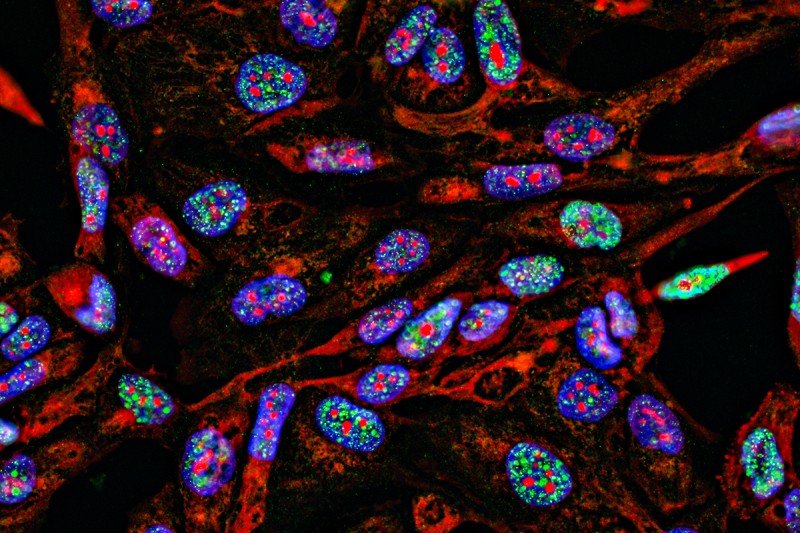
Several years ago, in a lab meeting, one of Nikolaus Schultz’s postdoctoral fellows posed a question: “Do you think it’s possible to predict, based on the genomic profile of an individual tumor, which organs it might metastasize to?”
And just like that, a research project was born.
Dr. Schultz is a computational oncologist in the Department of Epidemiology and Biostatistics at Memorial Sloan Kettering Cancer Center. He also serves as Head of Knowledge Systems in the Marie-Josée and Henry R. Kravis Center for Molecular Oncology. In these dual roles, he has gained a wealth of experience sequencing the DNA in patients’ tumors and using this information to help physicians guide treatment.

Every person with advanced cancer who is treated at MSK undergoes genetic sequencing of their tumor with MSK-IMPACT™, a tool that looks for mutations in 400-plus cancer-associated genes. Since sequencing started in 2014, MSK has compiled genetic tumor profiles from more than 50,000 patients. This vast repository represents a goldmine for biologists interested in asking questions about the relationships between tumor mutations and cancer progression.
Dr. Schultz and Francisco Sanchez-Vega — the curious postdoc who originally posed the question about metastasis and who is now an Assistant Attending Computational Oncologist at MSK — realized that they could use computational techniques to search this mountain of data for clues. Specifically, they could ask whether particular mutations (or groups of mutations) correlate with the spread of cancer to particular organs, across many different types of cancer.
That was six years ago. Now, in a paper published February 3, 2022, in the journal Cell, Drs. Schultz and Sanchez-Vega and their team, including postdoctoral researchers Bastien Nguyen and Christopher Fong, and 71 other MSK scientists present the results of their investigation.
To the question of whether it’s possible to look at an individual tumor and, based on its genomic profile alone, predict its precise future metastatic trajectory, the answer is clearly no.
Metastasis: How Cancer Spreads
“While we found some gene mutations to be slightly more common in tumor samples with specific metastatic transitions, we found no single gene that, when mutated, will predict with absolute certainty whether or not a tumor will metastasize to a particular organ,” Dr. Schultz says.
The study was revealing in other ways: “At a very high level, what the data are telling us is that metastatic disease is genomically different from primary disease,” Dr. Schultz says.
For example, in many cancer types, metastatic tumors have more of what geneticists call DNA copy-number changes compared with primary tumors. A DNA copy-number change is when a particular segment of DNA is present in greater or fewer than the normal number of copies. These copy-number changes, when observed in primary tumors, were an indicator of metastatic potential, Dr. Schultz points out.
In addition, he notes, some cancer-driving mutations were detected at different frequencies in metastases compared with primary tumors across a variety of cancer types.
Making the Data Available to Other Researchers
Dr. Schultz likens the extensive dataset his team has curated to The Cancer Genome Atlas (TCGA) project, in which he was also involved. “An important goal of TCGA was to assemble a valuable dataset and get it out into the world so that others could mine it,” he says.
To help researchers mine these new data for insights, the team is making them publicly available through the cBioPortal for Cancer Genomics as MSK-MET (Memorial Sloan Kettering – Metastatic Events and Tropisms).
The dataset includes information on genetic changes and clinical outcomes from 25,000 patients across 50 different cancer types.
A Shift in Perspective
Because no single mutation or set of mutations stood out as reliable predictors of metastatic behavior across tumor types, the new study may add support to an emerging framework in cancer science that views metastasis — the cause of 90% of cancer deaths — as not primarily driven by genetic mutations. Rather, epigenetic changes that occur in cancer cells as a consequence of their interactions with normal cells in the surrounding environment could be more to blame. (Epigenetic changes are ones that alter what genes are turned on or off in a cell without altering the DNA sequence as a mutation would.) These changes may underlie the ability of metastatic cells to adapt to otherwise hostile tissue environments.
Recent discoveries from other investigators at MSK — including Joan Massagué, Karuna Ganesh, Charles Sawyers, Kat Hadjantonakis, and Dana Pe’er — have pointed to a kind of epigenetically driven “identity switching” that enables cancer cells to assume more developmentally primitive states and thereby grow in new parts of the body.
Exploring the ramifications of these and other findings will be the focus of MSK’s new Marie-Josée and Henry R. Kravis Cancer Ecosystems Project, which launches today.
Further Opportunities for Data Mining and Extending Personalized Medicine
Currently, genetic sequencing of tumors with MSK-IMPACT can inform whether or not a specific patient should receive a specific drug based on a single genomic alteration. For example, if someone is found to have a mutation in the BRAF gene, they might be a good candidate for a targeted drug called vemurafenib.
But Dr. Schultz points out that there is potentially much more information to be found in the mass of sequencing data and associated patient clinical data that could inform treatment decisions.
“When properly mined, this data could tell us a lot more about prognosis of these patients, whether or not their tumors will metastasize, maybe even to what tissues,” he says. “This information might determine how these patients get monitored in the future. We can learn about what treatments they might be more sensitive to or less sensitive to. I think that there’s enormous potential for personalized medicine that goes beyond the single biomarker, and therefore justification to keep sequencing more patients with broader sequencing panels to increase our power to make new discoveries.”
- Genomic data from 25,000 patients with 50 different kinds of cancer allowed researchers to ask whether DNA mutations in a tumor could predict whether and where it would metastasize, or spread.
- While some mutations were slightly more common in tumors prone to certain metastatic events, no single mutation or group of mutations could predict with absolute certainty where a particular tumor would metastasize.
- The researchers found that some mutations, called DNA copy-number changes, were more common in metastatic tumors than in primary tumors, and these changes were predictive of metastatic potential when found in primary tumors.
- The dataset is being made publicly available to other researchers who wish to explore the relationship between genomic events and cancer progression.






